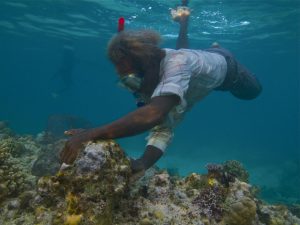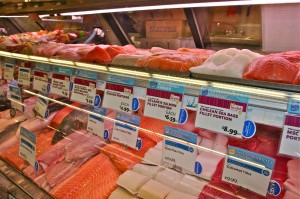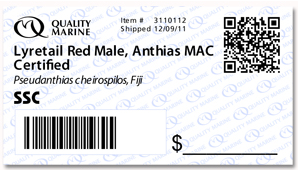In September, a peer-reviewed paper was published in the Journal of Agricultural Economics demonstrating, very broadly, that ecolabeling works. Ecolabelling—the practice of placing a label on a retail product to indicate the product is both “ecofriendly” and sustainably brought to market—has, over the past few years, gained widespread acceptance in products such as seafood, coffee, sugar, oil, and wine. In each of these industries, historic concerns about over-exploiting resources and abusing people involved in the harvest or processing of the product produced a desire in some consumers to know more about a product’s origins and the wider-reaching socio-economic impacts of bringing that product to market. When it comes to the success or failure of ecolabelling, the essential question is whether or not the aforementioned consumer desire is sufficient to cause enough market share to seek out and, in many cases, spend more on a product bearing an ecolabel. The study reported in Journal of Agricultural Economics answers that question in the affirmative when it comes to select ecolabelled seafood, and some believe ecolabelling can be equally successful in the marine aquarium trade.
Ecolabels are not new. Germany’s Blue Angel label, generally considered the first ecolabel, was first introduced in 1978. In the early 1990s, the United Nations Earth Summit Conference identified ecolabelling as an important tool for addressing unsustainable patterns of production and consumption. At about the same time, ecolabelling was introduced by the European Commission. Today a plethora of ecolabels confronts the average consumer on a daily basis across many product groups. Early ecolablleing programs were motivated, at least in part, by general and widespread concerns regarding the environmental performance of companies as consumers became more aware of the impacts of various industries ranging from paper to appliances. In the absence of a well-documented, transparent and trustworthy system certifying a product’s true environmental and social cost, sustainably minded consumers were largely unable to use their purchasing power to promote sustainability. Ecolabels have changed that, and recent studies show that ecolabels can provide economic incentive for industry to operate in a more sustainable manner.

Marine aquarium fisheries, like this one in the Solomon Islands, can provide incentive to fish sustainably and bring meaningful socio-economic development to remote coastal villages.
Not unlike many of the industries named above, the marine aquarium industry has a poor track record when it comes to providing transparent, verifiable information about the real impacts of harvesting marine animals for the aquarium trade. Unfortunately, too many of the animals entering the trade have been harvested from unsustainable fisheries by fishers who have been exploited literally to death in extreme cases. Entire reef ecosystems have been negatively impacted, as have local fishers, their families and their communities. A few model aquarium fisheries have proven it doesn’t have to be this way. Just like sustainable food fisheries, well-managed aquarium fisheries can provide economic incentive for fishing sustainably and for conservation initiatives like marine protected areas. Sustainable marine aquarium fisheries are also one of the most promising paths to appropriate socio-economic development for fishers living in remote parts of developing island nations that are just now entering global markets through trade, tourism and ever-widening communication networks.
As more aquarists become aware of the environmental and socio-economic costs and benefits of bringing fishes, corals and other invertebrates to market, they are faced with a choice. It is, however, a choice on which, up until very recently, it has been difficult to act given how difficult it is at the retail level to know anything about the origin of the animals for sale. The good news for sustainably minded aquarists is that a number of recently announced ecolabelling initiatives promise to provide the consumer with a real, transparent, well documented, and, hopefully, trustworthy choice. In a recent Coral Magazine interview with EcoAquariums Papua New Guinea, Ltd. Director Dan Navin, Navin discussed his fledgling company’s reef-to-retail ecolabeling program. In mid-December, Los Angeles-based Quality Marine announced its QR-Code tag program, an organism traceability concept that will put a lot of data at the fingertips of any consumer with a smartphone. Another Los Angeles wholesaler, Sea Dwelling Creatures, says it will be rolling out the Sustainably Managed Aquarium Resource Trade (SMART) ecolabelling program in conjunction with Reefcheck in the coming months.
Of course ecolabelling in and of itself is no silver bullet, and the many hurdles between concept and successful implementation are not to be underestimated. One need look no further than the Marine Aquarium Council’s (MAC) certification program and, more recently, SEASMART, a joint venture between U.S.-based EcoEZ and the Papua New Guinea National Fisheries Authority, to see that realizing a truly sustainable marine aquarium trade is a lot more complex than simply affixing a label to a bag. There remain lingering questions about how successful ecolabelling really is and if it can be scaled to a relatively small artisanal reef fishery like a marine aquarium fishery. There are other questions, too. Can the trade, within the private marketplace, come to some consensus in the criteria-setting process? Will a plethora of competing interests and agendas lead to a proliferation of ecolabels and even “green-washing,” resulting in little more than consumer confusion and, ultimately, fatigue?
To be clear, the road ahead is not at all obvious, but it does seem certain the future of a sustainable marine aquarium trade will include some form of ecolabelling. Without it—and, more importantly, without the transparency, documentation and source country impacts that should come with it—there is little hope the trade will be able to defend itself against those who are seeking to shut it down with ever increasing vigor. When primarily reliant on well-managed fisheries, the aquarium trade can provide economic incentive to fish sustainably and conserve embattled reef ecosystems. It can provide meaningful income to fishers and meaningful socio-economic development to villages taking their first tentative steps into global markets. In short, the marine aquarium trade can do a lot of good, and, right or wrong, the trade is going to have to prove that.
Ecolabelling is a very good place to start.













I saw some of the new QM labels at my LFS last week.
Which LFS, Tal? What did you think? Obviously you are not the “average aquarist” consumer, but I’d be interested in your opinion.
Moby Dick Pets in Waterford, MI. I’ll get pics the next time I’m there.
I love this concept. Thanks for the read